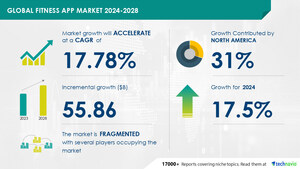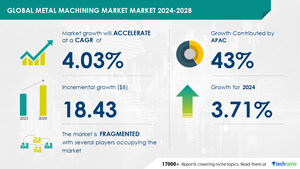NEW YORK, April 22, 2024 /PRNewswire/ -- The global artificial intelligence in asset management market size is estimated to grow by USD 10373.18 mn from 2023 to 2027, according to Technavio. The market is estimated to grow at a CAGR of 37.88% during the forecast period. North America held the largest share of the global market in 2022, and the market in the region is estimated to witness an incremental growth of 49%.
For more insights on the forecast market size and historic data (2017 - 2021) - Buy Now
Major Players in the Market
Numerous companies are capitalizing on this growing trend by implementing strategic measures such as alliances, partnerships, mergers, and acquisitions. Among the notable players in the cheese based snacks market are:
Amazon.com Inc., AXOVISION GmbH, BlackRock Inc., Deloitte Touche Tohmatsu Ltd., Genpact Ltd., Infosys Ltd., International Business Machines Corp., Lexalytics Inc., Microsoft Corp., New Narrative Ltd., Salesforce Inc., The Charles Schwab Corp.
Analyst Review
In the dynamic world of financial services, Artificial Intelligence (AI) is revolutionizing the Asset Management Market. Conversational platforms, such as Chatbots, powered by AI and Natural Language Processing (NLP), are transforming Business-to-Consumer (B2C) and Business-to-Business (B2B) interactions. FinTech companies are leveraging AI model-driven software platforms to navigate strict regulations and low-interest rates. The TIFIN AMP, an AI-based algorithmic model, streamlines financial transactions, enhancing operational efficiency and ensuring data quality. Human-machine interaction systems, including Deep Learning Chabots, improve client retention by providing personalized investment services to both residents and non-residents. AI's role in asset management is pivotal, shaping future business strategies in the financial services sector.
Key Market Drivers
Artificial Intelligence (AI) is revolutionizing the Asset Management industry by enabling data-driven decision making, risk management, and portfolio optimization. AI employs complex algorithms to analyze vast amounts of financial data from various sources, including business metrics, company announcements, newspapers, and historical trading data. This data is transformed into actionable insights, enabling asset managers to identify market inefficiencies and generate alpha. AI models also facilitate regulatory compliance monitoring, ensuring investor protection and privacy. Digital interactions between clients and human-machine interaction systems enhance operational efficiency and client retention. AI's ability to process large volumes of data quickly and accurately, even during market volatility, makes it an essential tool for asset managers in the low-interest-rate environment. Technology companies like EagleView, providing AI-powered analytics and software solutions, are transforming the Asset Management industry by optimizing investment processes, improving data quality, and reducing operational costs. Ethical thinking and privacy concerns are integral to AI's implementation in the industry.
Challenges and Opportunities
The Artificial Intelligence (AI) in asset management market experiences significant growth, driven by conversational platforms and chatbots in Business-to-consumer and Business-to-business applications. Advanced AI algorithms, including Natural Language Processing (NLP), computer vision, and voice recognition programs, require large data volumes to function effectively. However, strict regulations, low-interest rates, and market volatility necessitate robust data privacy and cybersecurity measures. AI algorithms, such as those used by Scotia Smart Investor and TIFIN Group, require access to sensitive financial data, raising concerns about investor protection and ethical thinking. Regulations, interest rates, and asset managers' business strategies continue to shape the financial services and investment services landscape. AI algorithms, machine learning, and big data analytics enable decision making, risk management, portfolio optimization, and compliance monitoring. Digital technology, including aerial imagery, virtual assistants, and voice recognition programs, facilitate data analysis and market insights for non-residents and businesses alike. Despite the benefits, AI algorithms must navigate strict regulations, ethical considerations, and data sources to ensure investor protection and privacy.
The Asset Management industry is embracing Artificial Intelligence (AI) to enhance operational efficiency and decision-making capabilities. AI models, such as those offered by EagleView and technology insiders, process vast amounts of historical trading data and market trends to identify patterns and trends, enabling alpha generation techniques. AI's ability to analyze economic data and market inefficiencies in real-time contributes significantly to alpha generation in wealth management. Quantitative modeling and deep learning algorithms are integral to AI's success in asset management. Human-machine interaction systems, including conversational platforms like chatbots, facilitate business-to-consumer and business-to-business transactions. Strict regulations necessitate high data quality, ensuring AI models' accuracy. Low-interest rates and the shift to remote work (WFH) have accelerated AI adoption. AI applications include computer vision, voice recognition programs, and virtual assistants. Technology companies provide software and analytics to asset managers, enabling them to optimize portfolios and improve client retention. Newspapers and financial transactions are increasingly analyzed using AI and natural language processing (NLP) to extract valuable insights. AI's role in asset management continues to expand, with applications in aerial imagery analysis and chatbot services.
To understand more about this market- Download a FREE Sample Report in minutes!
Market Overview
Artificial Intelligence (AI) is revolutionizing the Asset Management market through advanced technologies like machine learning and deep learning. The Converts, Platforms, and Algorithms used in AI enable efficient management of financial assets by analyzing historical data and predicting future trends. Businesses use AI to make informed decisions based on real-time market insights and risk assessments. The Intelligence gained from AI helps in identifying investment opportunities and optimizing portfolio performance. The use of AI in Asset Management is a game-changer, providing a competitive edge and enhancing overall investment strategies. The future of Asset Management lies in the integration of AI, enabling smarter, faster, and more accurate decision-making. The Techology is expected to grow significantly in the coming years, with companies like AI adopting this technology to stay ahead in the market.
About Technavio
Technavio is a leading global technology research and advisory company. Their research and analysis focuses on emerging market trends and provides actionable insights to help businesses identify market opportunities and develop effective strategies to optimize their market positions.
With over 500 specialized analysts, Technavio's report library consists of more than 17,000 reports and counting, covering 800 technologies, spanning across 50 countries. Their client base consists of enterprises of all sizes, including more than 100 Fortune 500 companies. This growing client base relies on Technavio's comprehensive coverage, extensive research, and actionable market insights to identify opportunities in existing and potential markets and assess their competitive positions within changing market scenarios.
Contacts
Technavio Research
Jesse Maida
Media & Marketing Executive
US: +1 844 364 1100
UK: +44 203 893 3200
Email: [email protected]
Website: www.technavio.com/
SOURCE Technavio
WANT YOUR COMPANY'S NEWS FEATURED ON PRNEWSWIRE.COM?
Newsrooms &
Influencers
Digital Media
Outlets
Journalists
Opted In





Share this article